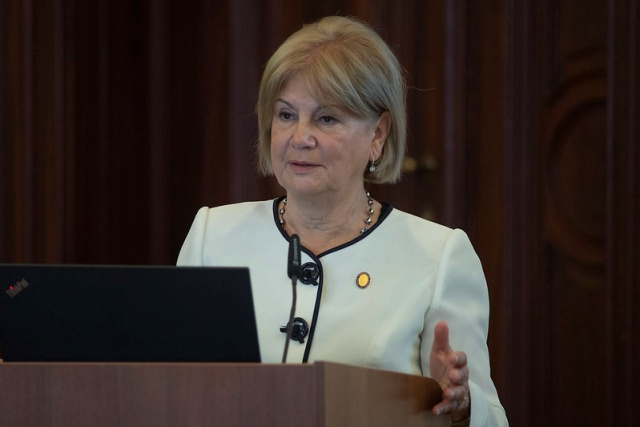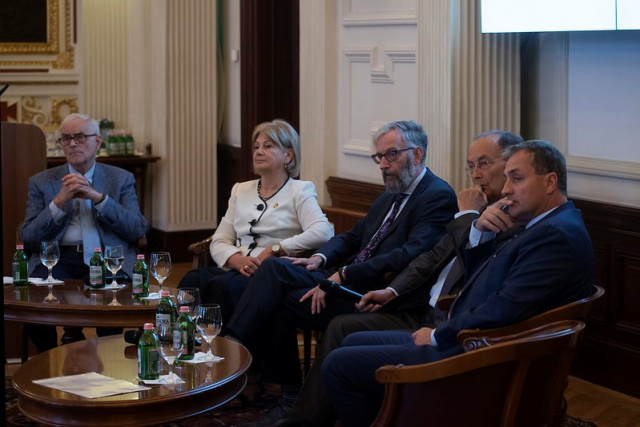Cancer screening programmes need new foundations – Video of international conference held at MTA HQ
The application of the latest scientific advances and testing techniques, and greater participation by people, could significantly reduce cancer mortality in the European Union, according to a report presented in Hungary at the Headquarters of the Hungarian Academy of Sciences. Watch a video of the conference and read the full report.
Click on the video below to watch the recording of the English-language conference.
Cancer is one of the leading causes of death across the developed world, including the European Union. In addition, as the population ages, the incidence of cancer is increasing, placing a huge burden on patients, their families and society as a whole, as in Europe
the annual economic damage caused by cancer exceeds EUR 100 billion (HUF 38.2 trillion).
This is why the European Commission has launched the Europe’s Beating Cancer Plan, one of the key elements of which is prevention and early detection: screening programmes.
“In 2020, 1.3 million people died of cancer in the European Union, and the number of cancer cases is still rising.
The only solution is early detection, that is, making screening more effective,” said Éva Kondorosi, research professor at the Szeged Biological Research Centre, who, as a member of the European Commission’s 7-member main scientific advisory group, was responsible for the cancer screening recommendations, based on the scientific evidence of SAPEA (Science Advice for Policy by European Academies). “The guidelines that determine cancer screening practice today are sometimes two decades old. They are now naturally outdated as new scientific advances are made continuously, and new technical options have been developed. This clearly calls for an update of existing cancer screening strategies.”
 Éva Kondorosi Photo: mta.hu / Tamás Szigeti
Éva Kondorosi Photo: mta.hu / Tamás SzigetiThe goal is to ensure that 90 percent of people are screened for breast, cervical and colon cancer within three years. The effectiveness of these screenings is now quite outstanding, thanks to scientific discoveries and technical and biotechnological innovations. However, it is essential that scientific results are analysed and evaluated by the most qualified experts in the field, so that scientific advisory bodies can provide sound guidance to policymakers. This is what the SAPEA community, who recently held a conference on the subject at the MTA’s Headquarters, has done in this case.
“With the decline in mortality from cardiovascular disease, cancer has become the leading cause of death in Europe over the last decade. Thanks to advances in treatment,
more and more people survive cancer, but survivors also place a heavy burden on society.
That is why it is urgent to find comprehensive and integrated answers to the challenges of cancer,” MTA Vice President György Kosztolányi said in his speech at the conference. “As a paediatrician, I fully agree with the need for screening, but I also know how complex the task of organising truly effective screening programmes is. They require coordination and additional resources from both professionals and institutions.”
These challenges only make it more important to base screening strategies on clear and objective scientific evidence.
“We have included in our recommendations the development of screening only for those cancer types where a positive, mortality-reducing effect of screening can be clearly demonstrated,” Eva Kondorosi emphasised. “There are cancer types, such as uterine cancer, where a positive effect of screening cannot be demonstrated in the early detection of the disease, but for many other types of tumours this is clear. The easier the test is technically, the more effective the detection will be. There are now cancer screening tests where the sample for testing can be taken by the people themselves at home.”
The SAPEA recommendations set out three main messages. The consortium believes that it is necessary to ensure that existing screening programmes make use of the most up-to-date, cutting-edge science results, and that these programmes are an integral part of the overall cancer treatment strategy. In addition, screening programmes should be extended to all cancers for which these interventions have a good risk-benefit ratio, are financially feasible and the costs are justified in the light of the expected outcomes. For example, they propose the widespread use of new screening technologies such as low-dose CT for lung cancer screening in smokers, prostate-specific antigen testing for early detection of prostate cancer, or Helicobacter testing for gastric cancer. Finally, they also point out that rapidly evolving technical possibilities must be exploited immediately to promote early detection. A system of constantly updated recommendations must be developed to ensure a rapid response, and protocols defining screening programmes in the Member States must be standardised across the EU.
 Click on the photo to see a photo gallery of the international conference. Photo: mta.hu / Tamás Szigeti
Click on the photo to see a photo gallery of the international conference. Photo: mta.hu / Tamás SzigetiSpeaking about lung cancer screening, Harry de Koning, Professor at Erasmus University Rotterdam, said that this type of cancer is responsible for 20 per cent of cancer deaths in the EU, so its burden clearly justified its evaluation in the report. “We know that if smokers stop smoking, they immediately reduce the risk of developing lung cancer, but for the next 10-15 years they will still be at a higher risk of developing cancer. This is why screening is also justified for them, and two extensive studies prove that screening for lung cancer with low-dose CT is clearly successful.”
In some cases, we now understand exactly what triggers cancer and this also makes screening more successful. In these cases, screening is no longer about the early detection of cancer, but about identifying patients at risk of cancer.
“Cervical cancer is almost always caused by infection with the human papillomavirus (HPV), so HPV screening detects the risk of cervical cancer better and earlier than classical cytological testing,” Éva Kondorosi says. “Moreover, in this case we need to use this knowledge not only for screening but also for active prevention, and vaccinate young people (both girls and boys) against HPV. This could lead to the simple elimination of HPV cervical cancer in future generations.”
But, of course, this can only be successful if those at risk of the disease cooperate.
“Harnessing the latest scientific knowledge is only one of the pillars of successful cancer screening. Equally important is the extent to which people participate in screening. This requires much more intensive information about the dangers of cancer on the one hand, and also about the screening options and their harmlessness on the other,” Eva Kondorosi argued. “There are huge differences between European countries in this respect.
In some countries, only 6 percent of people are screened, while in others their proportion is over 80 percent.
The low participation of younger people is also a big problem, because we already know that with breast cancer, for example, the tumour is often much more aggressive and difficult to treat in the 40-50 age group than in older age groups. We definitely need to extend the screening age limit to younger women.”
George Griffin, professor at St George’s University of London, and coordinator of the SAPEA cancer screening project, said that there is still a long way to go for researchers and health authorities to make screening for cancer types as effective as possible, but we have to start somewhere and this report is an excellent place to start. “Newly applicable techniques also present challenges. What should be done for people who are well but who test positive on a highly sensitive test? How do we treat them, how often do we screen them? These are very important questions.” The research exploring the links between cancer and genomics and molecular biology, the professor says, highlights the difficulties faced by researchers looking for the causes of tumours and ways to detect them early, but he believes that these efforts will soon help cure patients.
Click here to read the full SAPEA report.
Presentations
Introduction to SAPEA, GCSA and FEAM
Professor George Griffin
(FEAM Board Member and Coordinator of the FEAM-led SAPEA project on Cancer Screening,
Emeritus Professor of Infectious Diseases and Medicine at St George’s University of London, UK)
Improving cancer screening in the European Union SAPEA report
Professor Harry de Koning
(Deputy Head and Professor of Public Health and Screening Evaluation-Erasmus MC University Medical Center, Rotterdam, Netherlands)
Group of Chief Scientific Advisor’s Scientific Opinion on cancer screening
Professor Eva Kondorosi
(Group of Chief Scientific Advisors of the European Commission, Former Vice-President European Research Council, Biological Research Centre, Szeged, Hungary)
Main barriers in existing cancer screening programmes in the EU: Experience from the EUTOPIA H2020 Project
Marcell Csanádi
Health Economist, Researcher at Syreon Research Institute, Hungary
Potential advances for screening techniques
Professor George Griffin
(FEAM Board Member and Coordinator of the FEAM-led SAPEA project on Cancer Screening, Emeritus Professor of Infectious Diseases and Medicine at St George’s University of London, UK)
